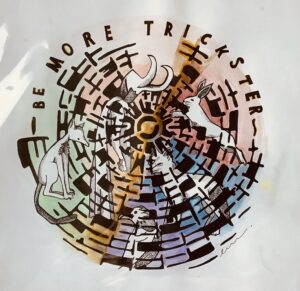I’ve always been fascinated by the role language plays in meaning making and for several years my walk of faith has been helped by entering into dialogue with nature through of emerging church space Mountain Pilgrims. Thomas Berry suggests humanity has broken The Great Conversation, the deep, ongoing dialogue between humans, the more-than-human world, and the wider universe. We talk a lot, but mostly to ourselves and church is no different to any other eco chamber. It has developed a sophisticated internal language but often struggles to hear, let alone respond to, the voices of culture, creation and those at the edges questioning what counts as “orthodox.”
Berry’s concern was not simply about ecology but about language. When only one way of speaking is recognised as valid, everything else gets pushed to the margins. That resonates with our ecclesial habits. The church has learned to privilege certain kinds of words, authorised, platformed, “sound” and to distrust improvisation, lived experience, and wild metaphors that do not fit existing systems. I know even writing this several people will comment on how I’ve lost the plot, gone mad and am talking to trees again. The result is a narrowing of conversation and, with it, a shrinking of imagination.
One thing thirty years of mission has taught me is that that like G-d, Language is not a museum piece; it is a living, mutating thing, constant in its movement even when the printed page pretends otherwise. Berry’s work suggests that meaning arises in the between in relationships, exchanges, frictions rather than in frozen statements detached from place and encounter. If that is true, then a church that tries to manage its language purely through control (doctrinal, institutional, reputational) ends up disconnecting its words from the world they were meant to serve.
A similar concern sits behind recent reflections on how church handles its public voice: the drift from conversation into messaging, from mutuality into management. When our words exist mainly as outputs, strategies, statements, carefully curated content, we are no longer participating in language as a shared, risky, evolving practice. We have moved from speaking with to speaking at.
The irony is that the Christian tradition, at its best, already knows that meaning is relational. The gospel of John points to Logos not as a static “word” dropped from the sky, but as a dynamic, relational presence through whom all things come into being.
Orthodoxy should be a faithful emerging conversation but too often it is treated as a fixed package, a set of statements that must remain untouched in order to be “true.” But if God is encountered in history, in bodies, in place, then faithfulness cannot be about freezing language; it has to be about staying in truthful conversation as the world changes. This does not mean anything goes but it does mean that orthodoxy cannot be maintained by shutting down dialogue with those who unsettle us. The temptation is always to label the troubling voices as “unorthodox” so we don’t have to listen. But perhaps the deeper danger is a church that can repeat the right phrases while refusing the great conversation where the Spirit might be speaking in unfamiliar accents.
If orthodoxy is reframed as fidelity-in-movement, then the test of soundness shifts. The questions being asked are more about if this way of speaking or being deepens love of God, neighbour, and creation, or does it protect systems at their expense? This is a very different conversation from a lot of what I hear and ff the church is to re-enter the great conversation, who or what are are the conversation partners we need need. None of these named below are new, but each reveals how thin our language becomes when separated from encounter.
1. With the more-than-human world
Creation is often reduced to backdrop or resource in church practice, something we “use” or “care for,” but rarely someone we listen to. Emerging eco-liturgies, “wild church” practices and place-based spirituality are tentative attempts to let rivers, soil, seasons and species become conversation partners rather than illustrations. What happens to orthodoxy when the groans of creation are treated not as background noise but as part of the community’s discernment?
2. With decolonising and marginal voices
Mission history has trained Western churches to imagine themselves as speakers and others as listeners. Decolonising work insists that the roles must be reversed, or at least shared: theologies forged in colonised, racialised, and economically marginalised contexts need not only to be “included” but allowed to interrogate and reshape what the centre calls orthodox.
3. With shifting identities and bodies
Conversations around gender, sexuality, neurodiversity and family structures are often handled through statements rather than stories. People are turned into “issues,” and language is deployed to control rather than to understand. Yet if the body of Christ is genuinely diverse, then these lives and experiences are not detachable from theology; they are part of the place where theology happens. Staying in conversation here may mean discovering that some of our long-held assumptions were more cultural than Christlike.
4. With digital and symbolic worlds
Digital culture is not simply another channel for church messaging; it is a habitat where new forms of presence, authority and belonging are emerging. Online communities, memes, gaming, AI, are all forming people’s imaginations long before they meet a sermon. A church that only uses these spaces to broadcast pre-formed content refuses the opportunity to learn a new dialect of human longing and connection. Conversation here would mean showing up not as brand but as neighbour.
Berry writes of the need for a “new language” that can draw humans back into a mutually enhancing relationship with the rest of the community of life. That newness is less about inventing clever phrases and more about recovering humility and recognising that our words must once again be accountable to the earth, to history, to those who suffer under our systems.
Perhaps this is where pioneers and locally rooted parishes have role: to keep pointing to the gaps between our official language and the real conversations happening at the edges. To remind the church that the Spirit has always been ahead of us, out in the wild, teaching new words to those willing to listen.
Re-entering the great conversation will mean losing some of the safety that comes from tightly managed speech. It will also mean discovering that orthodoxy is not a fragile artefact to be defended, but a living stream kept fresh precisely because it flows through new landscapes, picks up new sediments, and keeps finding its way back to the sea and the source.


